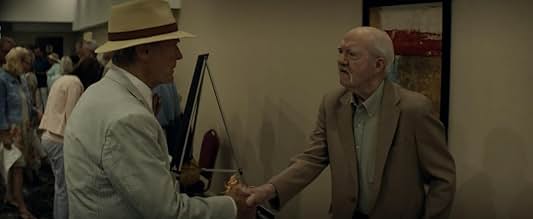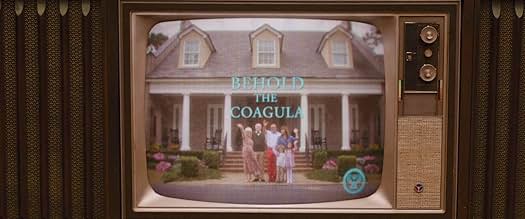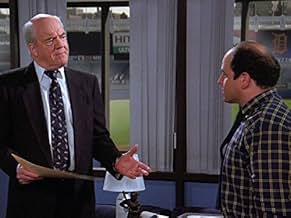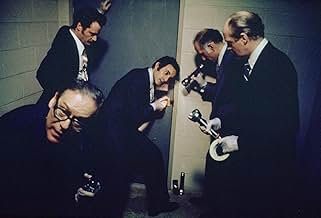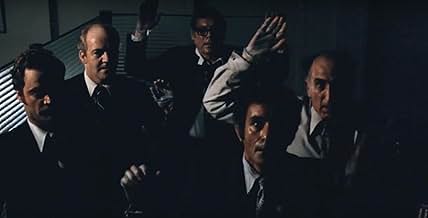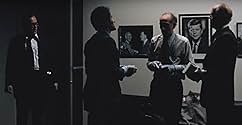Richard Herd(1932-2020)
- Actor
- Additional Crew
Utilitarian character actor Richard Herd was one of those stern familiar faces you saw countless times on film and TV but couldn't quite place the name. The stage-trained actor, who shared a striking resemblance to actor Karl Malden, never found the one role that would make him a household name, but did make up for it with a number of rich and rewarding stage, film and TV assignments bolstered by his trademark authoritarian look and stance.
Born on September 26, 1932 in Boston, Massachusetts, he was the son of Katherine (Lydon) and Richard Herd, a railroad engineer and WWII vet, who died when the boy was quite young. The younger Herd suffered from bone marrow cancer which affected the growth of his legs as a child. As a result, he was educated at the Industrial School for Crippled Children during his formative years. Luckily, loving care and several operations saved his legs from deformity.
It was his mother Katherine's love of music that ignited Richard's initial desire to perform. Trained on the drums, he received early acting training on radio and in summer stock (Liberty Mutual Theatre in Boston) during his high school years and, in the late 1940s, studied Shakespeare under veteran Claude Rains at one point. Other plays such as "Our Town" and "Sing Out Sweet Land," and the children's theatre productions of "Penrod" and "Robin Hood" helped to beef up his early resume.
Richard enlisted in the Army during the Korean War but injured a knee in basic training, which led to an honorable discharge within 90 days of his enlistment. He did, however, go on to work for the Army Signal Corps in a host of training films.
Richard continued to gather experience in such classical plays as "The Miser" and "A Month in the Country". With several summer stock runs, Shakespearean bus-and-truck tours and industrial films under his belt, he finally made his New York debut in the minor role of an usher in The Dress Circle" at Carnegie Hall. He also became a member of the Player's Club.
Making a highly inauspicious film debut in the minor role of a coach in the film, Hercules in New York (1970), which was the showcase debut for the massively-muscled Arnold Schwarzenegger, Richard didn't settle in Hollywood, until the mid 1970s, after replacing actor Richard Long (who died before filming began) in the role of Watergate figure James McCord in All the President's Men (1976). Although Richard made a handful of other movies throughout the rest of the decade (I Never Promised You a Rose Garden (1977), F.I.S.T (1978), The China Syndrome (1979), The Onion Field (1979)), he appeared with much more frequency on TV, playing stern, authoritarian types on episodes of Kojak (1973), The Rockford Files (1974), The Streets of San Francisco (1972) (starring the similar-looking Karl Malden), Rafferty (1977), Eight Is Enough (1977) and Starsky and Hutch (1975), as well as in the TV movies Pueblo (1973), Captains and the Kings (1976), The Hunted Lady (1977), Dr. Scorpion (1978), Kate Bliss and the Ticker Tape Kid (1978), Terror Out of the Sky (1978), Marciano (1979) and, most notably, Ike: The War Years (1979), in which he portrayed General Omar Bradley.
Never finding the one support role that might have made him a character star, Richard nevertheless was featured impressively on all three mediums for over four decades. On stage, he appeared in a pre-Broadway tryout of "On the Waterfront" and played, to great applause, in productions of "Other People's Money" and "The Big Knife". His finest hour on stage, however, would come with his portrayal of the epic film producer in the one-man show "Cecil B. DeMille Presents", which he has toured throughout the country. On TV, Richard has guested on most of the popular TV programs of late, including Desperate Housewives (2004) and CSI: Miami (2002) and is probably best remembered for his recurring roles as "Admiral Noyce" on Seaquest DSV (1993), as Jason Alexander's boss "Wilhelm" in the sitcom classic, Seinfeld (1989), and as "Admiral Owen Paris" in Star Trek: Voyager (1995). A few of his lightweight cinematic crowd-pleasers include Private Benjamin (1980), Deal of the Century (1983), Planes, Trains & Automobiles (1987) and Sgt. Bilko (1996). More recently, he also had a memorable bit in the Oscar-winning horror film Get Out (2017).
On occasion, Richard moved into the director/producer/writer's chair. He directed the play, "Idle Wheels", for the Road Theatre Company in North Hollywood, was a producer of the N.Y. play, "Agamemnon", and co-producer (and performer) of the play, "The Couch with the Six Insides", and, as a playwright, had a presentation of his play, "Prisoner of the Crown", produced at Dublin's Abbey Theatre.
Married briefly at the age of 19, Richard remarried and had two children (Richard Jr. and Erica) by his second wife. That marriage also ended in divorce, but his third (in 1980), to actress Patricia Herd (Patricia Crowder Ruskin), lasted. Patricia has a daughter from an earlier marriage. Making his final film appearances in the Clint Eastwood vehicle The Mule (2018) and the baseball biopic The Silent Natural (2019), Richard was diagnosed with cancer and died on May 26, 2020, at age 87.
Born on September 26, 1932 in Boston, Massachusetts, he was the son of Katherine (Lydon) and Richard Herd, a railroad engineer and WWII vet, who died when the boy was quite young. The younger Herd suffered from bone marrow cancer which affected the growth of his legs as a child. As a result, he was educated at the Industrial School for Crippled Children during his formative years. Luckily, loving care and several operations saved his legs from deformity.
It was his mother Katherine's love of music that ignited Richard's initial desire to perform. Trained on the drums, he received early acting training on radio and in summer stock (Liberty Mutual Theatre in Boston) during his high school years and, in the late 1940s, studied Shakespeare under veteran Claude Rains at one point. Other plays such as "Our Town" and "Sing Out Sweet Land," and the children's theatre productions of "Penrod" and "Robin Hood" helped to beef up his early resume.
Richard enlisted in the Army during the Korean War but injured a knee in basic training, which led to an honorable discharge within 90 days of his enlistment. He did, however, go on to work for the Army Signal Corps in a host of training films.
Richard continued to gather experience in such classical plays as "The Miser" and "A Month in the Country". With several summer stock runs, Shakespearean bus-and-truck tours and industrial films under his belt, he finally made his New York debut in the minor role of an usher in The Dress Circle" at Carnegie Hall. He also became a member of the Player's Club.
Making a highly inauspicious film debut in the minor role of a coach in the film, Hercules in New York (1970), which was the showcase debut for the massively-muscled Arnold Schwarzenegger, Richard didn't settle in Hollywood, until the mid 1970s, after replacing actor Richard Long (who died before filming began) in the role of Watergate figure James McCord in All the President's Men (1976). Although Richard made a handful of other movies throughout the rest of the decade (I Never Promised You a Rose Garden (1977), F.I.S.T (1978), The China Syndrome (1979), The Onion Field (1979)), he appeared with much more frequency on TV, playing stern, authoritarian types on episodes of Kojak (1973), The Rockford Files (1974), The Streets of San Francisco (1972) (starring the similar-looking Karl Malden), Rafferty (1977), Eight Is Enough (1977) and Starsky and Hutch (1975), as well as in the TV movies Pueblo (1973), Captains and the Kings (1976), The Hunted Lady (1977), Dr. Scorpion (1978), Kate Bliss and the Ticker Tape Kid (1978), Terror Out of the Sky (1978), Marciano (1979) and, most notably, Ike: The War Years (1979), in which he portrayed General Omar Bradley.
Never finding the one support role that might have made him a character star, Richard nevertheless was featured impressively on all three mediums for over four decades. On stage, he appeared in a pre-Broadway tryout of "On the Waterfront" and played, to great applause, in productions of "Other People's Money" and "The Big Knife". His finest hour on stage, however, would come with his portrayal of the epic film producer in the one-man show "Cecil B. DeMille Presents", which he has toured throughout the country. On TV, Richard has guested on most of the popular TV programs of late, including Desperate Housewives (2004) and CSI: Miami (2002) and is probably best remembered for his recurring roles as "Admiral Noyce" on Seaquest DSV (1993), as Jason Alexander's boss "Wilhelm" in the sitcom classic, Seinfeld (1989), and as "Admiral Owen Paris" in Star Trek: Voyager (1995). A few of his lightweight cinematic crowd-pleasers include Private Benjamin (1980), Deal of the Century (1983), Planes, Trains & Automobiles (1987) and Sgt. Bilko (1996). More recently, he also had a memorable bit in the Oscar-winning horror film Get Out (2017).
On occasion, Richard moved into the director/producer/writer's chair. He directed the play, "Idle Wheels", for the Road Theatre Company in North Hollywood, was a producer of the N.Y. play, "Agamemnon", and co-producer (and performer) of the play, "The Couch with the Six Insides", and, as a playwright, had a presentation of his play, "Prisoner of the Crown", produced at Dublin's Abbey Theatre.
Married briefly at the age of 19, Richard remarried and had two children (Richard Jr. and Erica) by his second wife. That marriage also ended in divorce, but his third (in 1980), to actress Patricia Herd (Patricia Crowder Ruskin), lasted. Patricia has a daughter from an earlier marriage. Making his final film appearances in the Clint Eastwood vehicle The Mule (2018) and the baseball biopic The Silent Natural (2019), Richard was diagnosed with cancer and died on May 26, 2020, at age 87.


